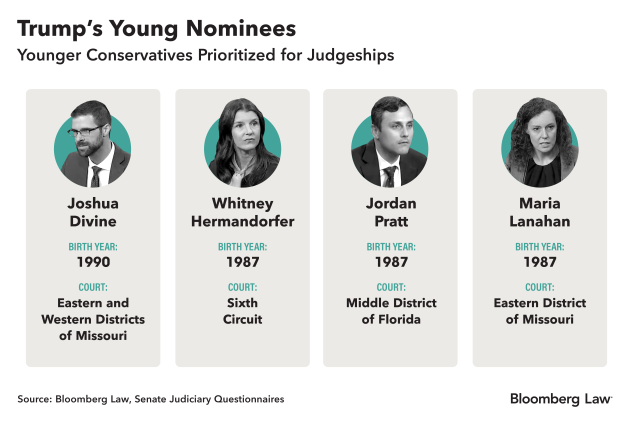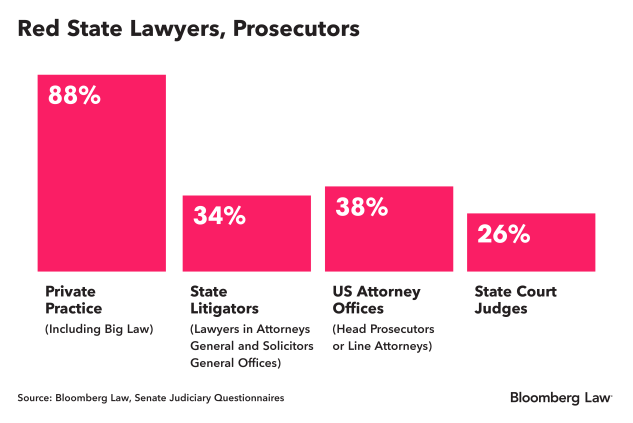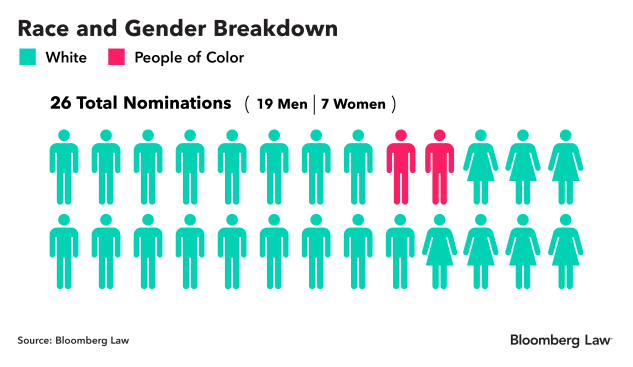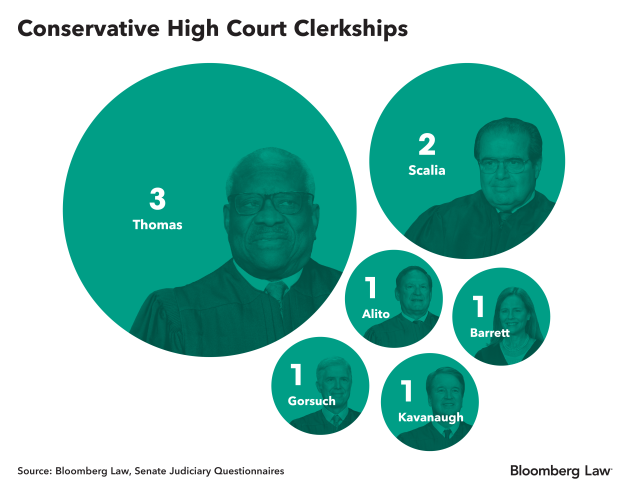President Donald Trump was expected to seek a different kind of judicial nominee this term: fewer establishment Federalist Society types and more “bold and fearless” conservatives who’ve signaled personal loyalty to him.
He’s still picking lawyers who’ve been members of the conservative networking organization since law school or the beginning of their legal careers, but many also have track records on issues critical to the conservative legal movement.
“They’re cut from a similar cloth as the nominees from his first term, but to a more extreme degree,” said John P. Collins, a George Washington University Law professor who studies and tracks judicial nominations.
Trump has had fewer openings to fill with preferred picks. He’s started the term with fewer judicial vacancies compared to last time. Judges have been slow to announce retirements and create more seats to fill.
Here’s a look at the nominees so far—by the numbers:
Millennial Picks
Judicial nominees have only become younger as more recent presidents have sought to cement their legacy on the federal bench. Trump has pushed the bounds of that trend. Of the 20 nominees who’ve appeared before the Senate Judiciary Committee for confirmation hearings this year, two-thirds were 44 or younger.
The average and median age of all Trump’s lower court nominees last time was 48, according to Collins. Trump’s youngest pick this year, Joshua Divine, was 35 when Trump tapped him for a Missouri judgeship. Divine now serves as a judge on both of Missouri’s federal trial courts.
Red State Representation
Trump drew heavily from the ranks of lawyers in Republican-led attorneys general and solicitors general roles, building on a practice from his first term. Many of these young lawyers have had significant experience litigating against the Biden administration’s policies in the realm of gun rights, abortion, immigration, transgender issues, and federal regulatory power generally.
“From what I’ve heard the individuals in the pipeline will to continue to be young, aggressive, and most importantly—conservative,” said Robert Luther III, a professor at Antonin Scalia Law School at George Mason University who worked on judicial nominations in the first Trump White House.
Diversity Profile
Diversity didn’t seem to be a primary concern for Trump in filling judicial vacancies during his first term, and he hasn’t indicated that would change. Of his 26 announced picks this year, two are people of color: Bill Lewis, who is Black, for the Middle District of Alabama; and Eric Tung, who is Asian American, for a California seat on the Ninth Circuit.
Tung’s selection reprises a trend from Trump’s first presidency: As he’s sought reliable conservatives for the appellate bench, he’s also increased Asian American representation. Of the 11 active circuit judges who self-identified as Asian American or Pacific Islander at the end of Trump’s first term, he appointed seven. Three of his six total appellate nominees are women.
Notable Clerkships
Around 70% of his judicial selections have had federal clerkships. A handful clerked for conservative Supreme Court justices. Most of his appellate nominees are drawn from the clerk ranks of justices appointed last time by Trump, in addition to Antonin Scalia, Clarence Thomas, and Samuel Alito—the latter two conservatives hope will retire and create vacancies for Trump to fill with similar jurists. Half of the 26 total nominees clerked with circuit judges, including prominent conservatives such as William Pryor of the Eleventh Circuit and Raymond Gruender of the Eighth Circuit.
Top Schools
Trump’s selections typically attended a variety of law schools. Both administrations have been “less interested in where nominees went to law school than whether they excelled at law school,” said Michael Fragoso, a former top aide to then-Senate Republican Leader Mitch McConnell (R-Ky.).
Continuing a trend from his first term, four of his nominees have either attended or taught at George Mason’s Antonin Scalia Law School—where several of the conservative justices have taught.
It’s “the latest evidence that Scalia Law School is now an elite American law school by all traditional evaluation metrics,” Luther said.
Half of Trump’s appeals court picks graduated from the country’s top law schools. The other half earned degrees from George Washington University and Notre Dame. George Washington Law grads Whitney Hermandorfer and Jennifer Mascott, nominated for the Sixth Circuit and Third Circuit, respectively, earned some of the highest GPAs on record there.
Overall, a third of Trump’s judicial selections so far graduated from Yale, University of Chicago, Georgetown, Harvard, and the University of Pennsylvania.
To contact the reporter on this story:
To contact the editors responsible for this story:
Learn more about Bloomberg Law or Log In to keep reading:
See Breaking News in Context
Bloomberg Law provides trusted coverage of current events enhanced with legal analysis.
Already a subscriber?
Log in to keep reading or access research tools and resources.





